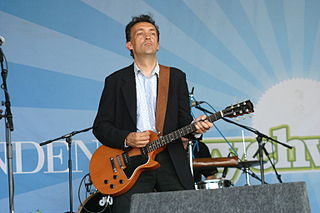Top 26 Quotes & Sayings by Justin Adams
Explore popular quotes and sayings by an English musician Justin Adams.
Last updated on April 15, 2025.
In Western classical music the idea of holiness, purity, perfection, and total beauty is expressed through clarity of sound - a bell-like sound. Obviously, that has its own place, and it's a beautiful way of doing it. But I don't think I am the first to point out that in Africa, the more buzzing the sound is, the more it indicates the other world - the spirit world.
In some traditional African dances, people wear masks in order to become the embodiments of particular spirits. I have heard that they often cover the mouth-piece with spider webs or something that resonates, so that their voice gets distorted, ceasing to be the voice of a human and becoming representative of a voice that comes from another world.
The human condition is what it is. We can see beauty and wonder in the world, but we also face imminent death and uncertainty, and we often need to sidestep the idea of time and communicate with each other, not with words but with a sense of community and union. I don't want to make an overreaching statement, but I think that's the function of culture.




















